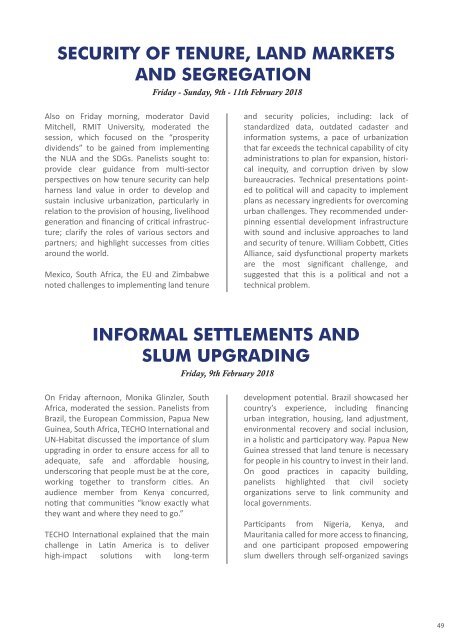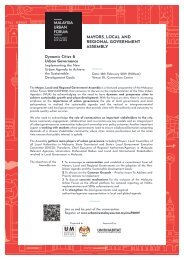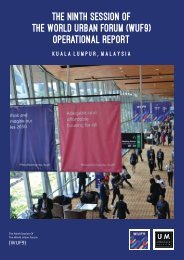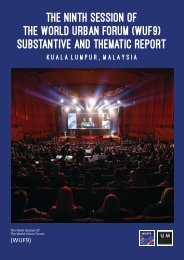WUF9 Substantive Report-s
Create successful ePaper yourself
Turn your PDF publications into a flip-book with our unique Google optimized e-Paper software.
SECURITY OF TENURE, LAND MARKETS<br />
AND SEGREGATION<br />
Friday - Sunday, 9th - 11th February 2018<br />
Also on Friday morning, moderator David<br />
Mitchell, RMIT University, moderated the<br />
session, which focused on the “prosperity<br />
dividends” to be gained from implemenng<br />
the NUA and the SDGs. Panelists sought to:<br />
provide clear guidance from mul-sector<br />
perspecves on how tenure security can help<br />
harness land value in order to develop and<br />
sustain inclusive urbanizaon, parcularly in<br />
relaon to the provision of housing, livelihood<br />
generaon and financing of crical infrastructure;<br />
clarify the roles of various sectors and<br />
partners; and highlight successes from cies<br />
around the world.<br />
Mexico, South Africa, the EU and Zimbabwe<br />
noted challenges to implemenng land tenure<br />
and security policies, including: lack of<br />
standardized data, outdated cadaster and<br />
informaon systems, a pace of urbanizaon<br />
that far exceeds the technical capability of city<br />
administraons to plan for expansion, historical<br />
inequity, and corrupon driven by slow<br />
bureaucracies. Technical presentaons pointed<br />
to polical will and capacity to implement<br />
plans as necessary ingredients for overcoming<br />
urban challenges. They recommended underpinning<br />
essenal development infrastructure<br />
with sound and inclusive approaches to land<br />
and security of tenure. William Cobbe, Cies<br />
Alliance, said dysfunconal property markets<br />
are the most significant challenge, and<br />
suggested that this is a polical and not a<br />
technical problem.<br />
INFORMAL SETTLEMENTS AND<br />
SLUM UPGRADING<br />
Friday, 9th February 2018<br />
On Friday aernoon, Monika Glinzler, South<br />
Africa, moderated the session. Panelists from<br />
Brazil, the European Commission, Papua New<br />
Guinea, South Africa, TECHO Internaonal and<br />
UN-Habitat discussed the importance of slum<br />
upgrading in order to ensure access for all to<br />
adequate, safe and affordable housing,<br />
underscoring that people must be at the core,<br />
working together to transform cies. An<br />
audience member from Kenya concurred,<br />
nong that communies “know exactly what<br />
they want and where they need to go.”<br />
TECHO Internaonal explained that the main<br />
challenge in Lan America is to deliver<br />
high-impact soluons with long-term<br />
development potenal. Brazil showcased her<br />
country’s experience, including financing<br />
urban integraon, housing, land adjustment,<br />
environmental recovery and social inclusion,<br />
in a holisc and parcipatory way. Papua New<br />
Guinea stressed that land tenure is necessary<br />
for people in his country to invest in their land.<br />
On good pracces in capacity building,<br />
panelists highlighted that civil society<br />
organizaons serve to link community and<br />
local governments.<br />
Parcipants from Nigeria, Kenya, and<br />
Mauritania called for more access to financing,<br />
and one parcipant proposed empowering<br />
slum dwellers through self-organized savings<br />
49






